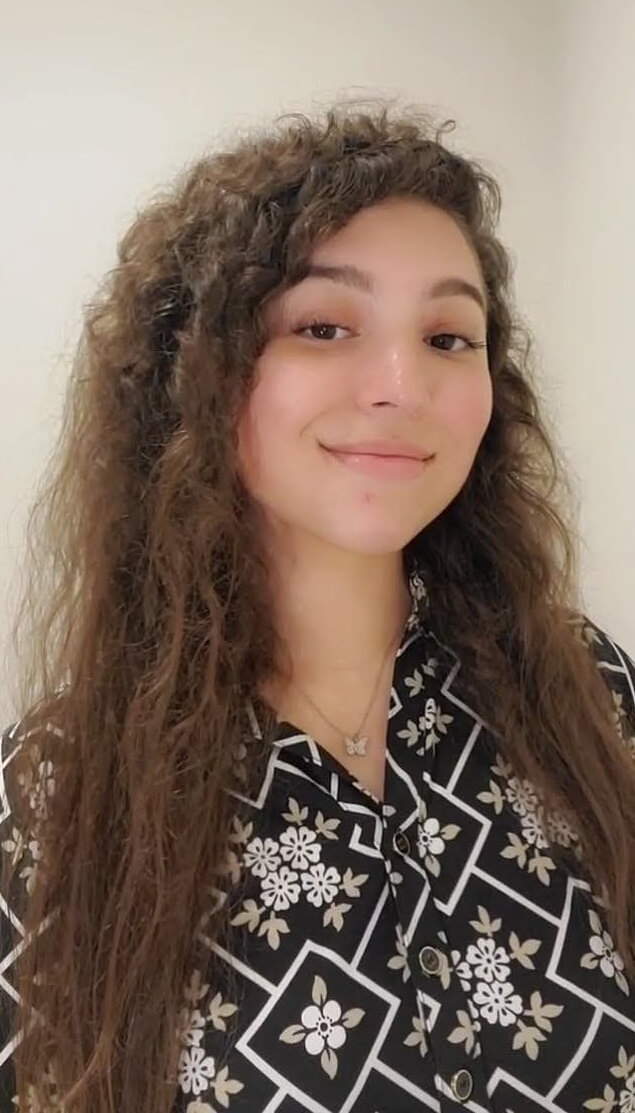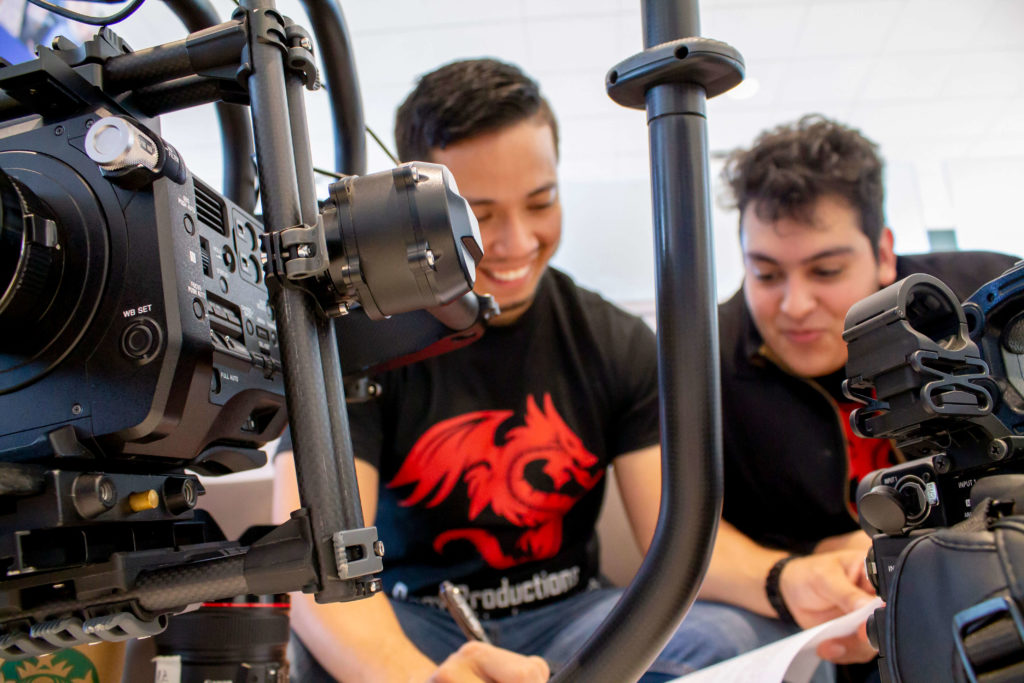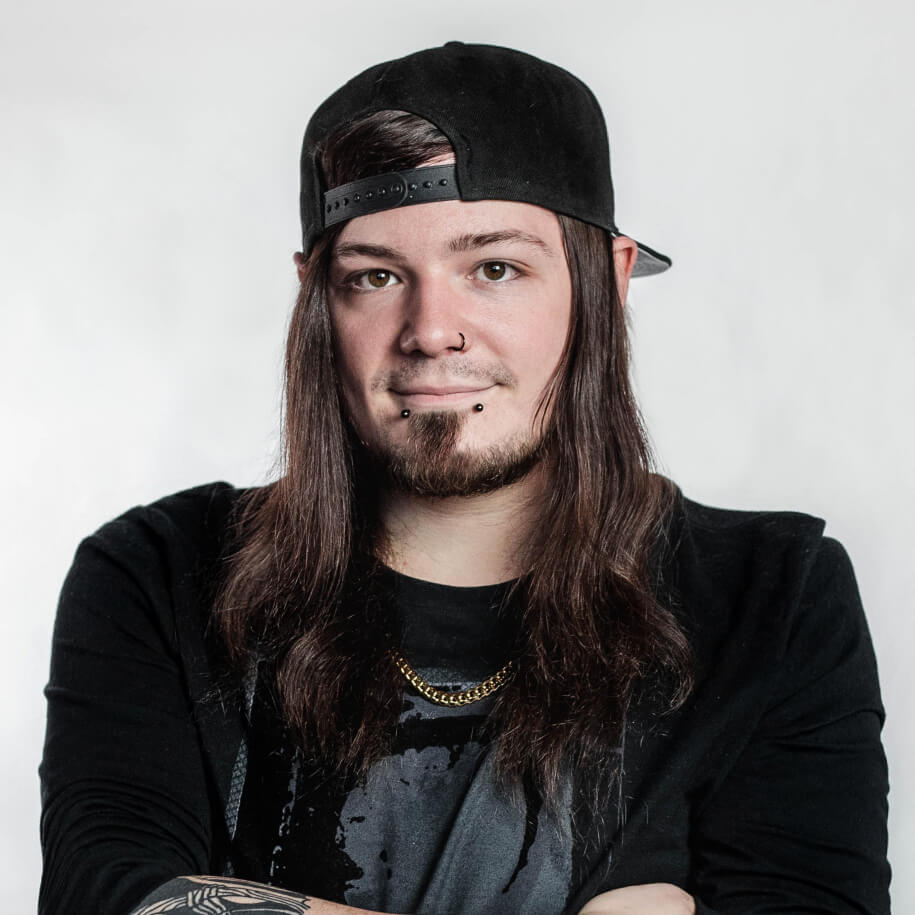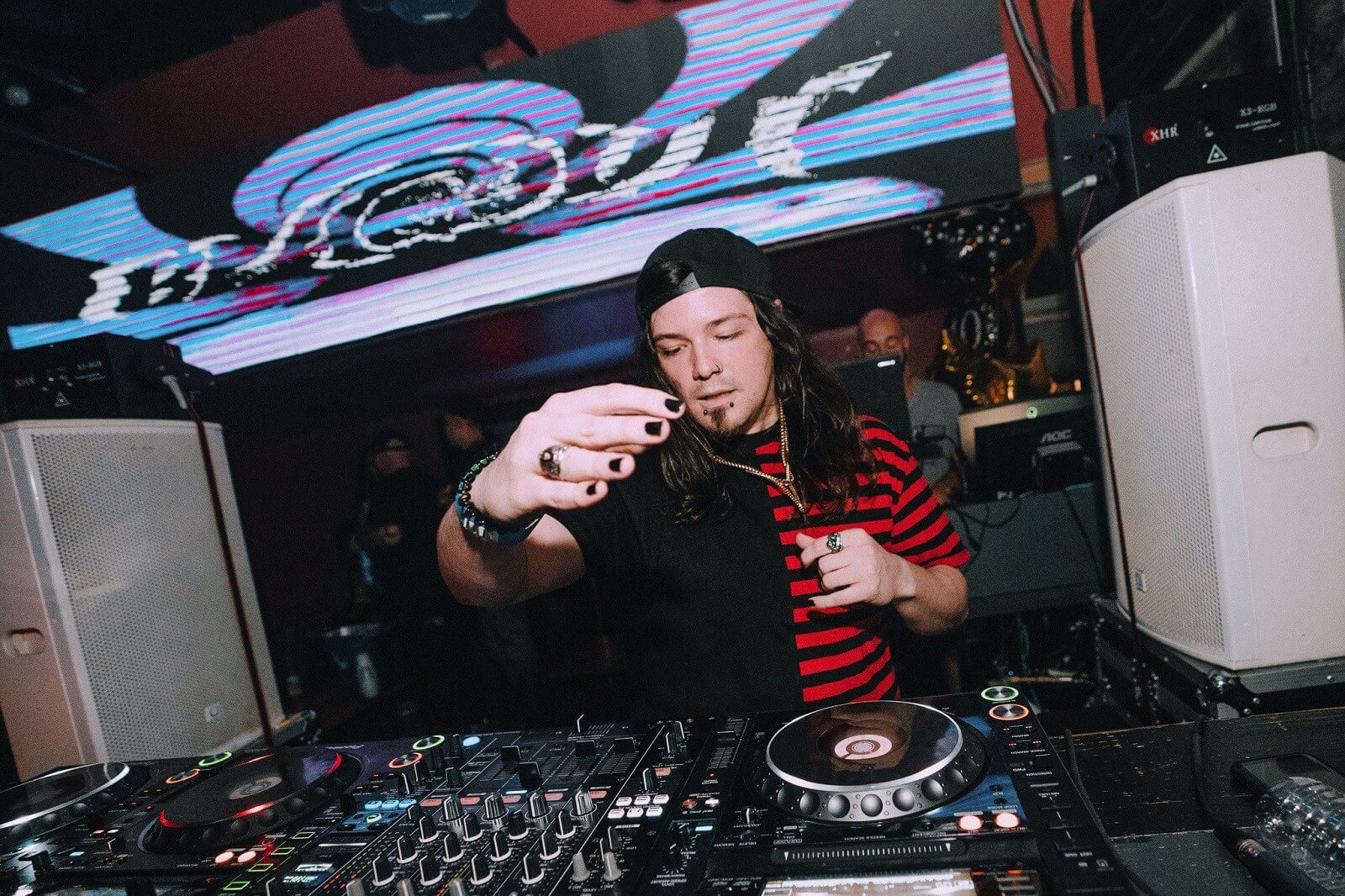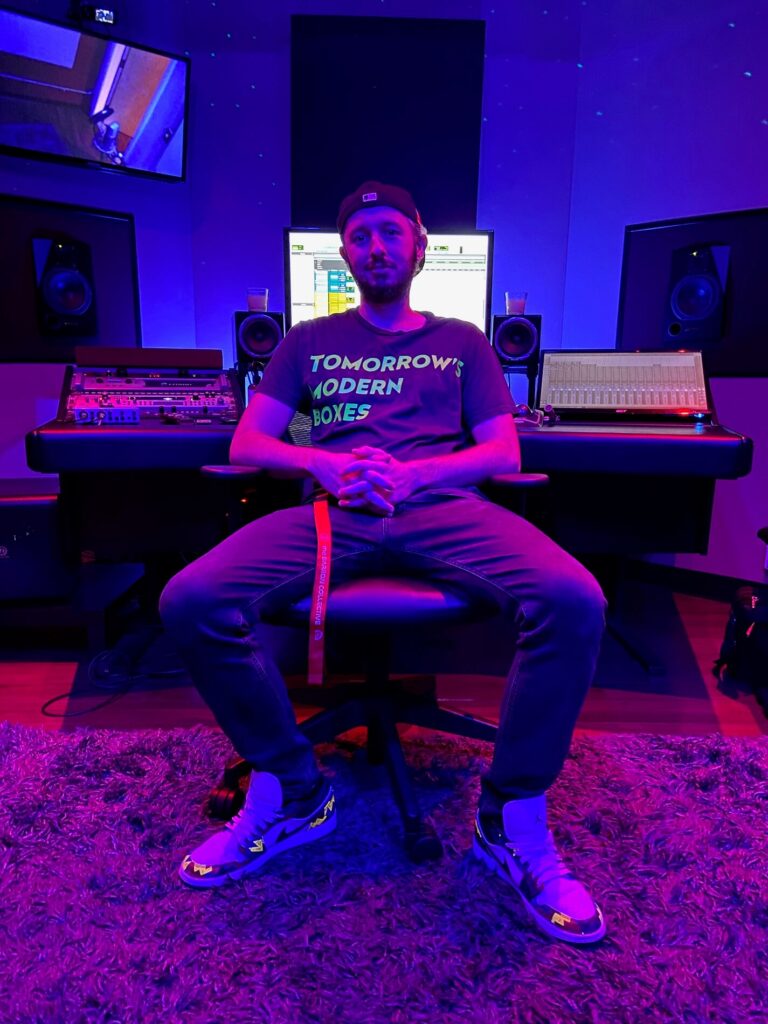
Recording Connection graduate Neil O’Reilly
grad
Neil O’Reilly completed Recording Connection’s 6–9-month Audio Engineering & Music Production Program in 2019. And even though he graduated feeling on-fire and ready to launch his career as an audio engineer, he found life and his “regular job” perpetually standing in the way. When circumstances out of his control led to him getting laid off, moping was
not on the itinerary. With time on his side, Neil got busy, built connections, and got collaborating with artists worldwide. Now, Neil’s right where he wants to be. As “the guy in the chair” he’s mixing it up at Barron Collective and making it happen, one session at a time.
Once you knew you were ready to build your chops in audio, what made you choose Recording Connection?
“Because I am or consider myself more of a people person and a creative, that it [Recording Connection] was just a streamline to really get a crash course on not only just technical aspects of it but just the relationship aspect… really appealed to me…. One of the greatest things somebody ever told me was, ‘You’re going to have more work as a decent engineer but a really good person that people like to work with than the best engineer in the world that people can’t stand to be around…. I love like working with people and just creative people and being part of the creative process.”
Ryan Venable showed Neil how to run productive sessions with artists. Learn more in our Straight Talk video below!
You had the privilege of externing at Studio 713 where you trained with two very notable engineers, both with multi-platinum tracks under their belts—Matt O’Neil and Ryan Venable (Travis Scott, Justin Bieber, Don Toliver), a Recording Connection grad. What was it like?
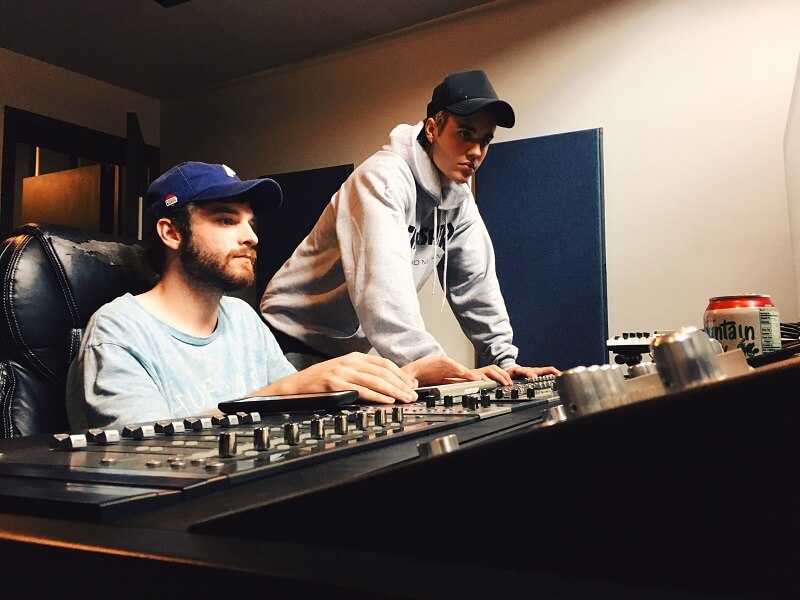
Ryan Venable and Justin Bieber at Studio 713
“Walking into a studio and seeing like the setup and the vibe and the feel and just everybody just like cooking up or having a good time, it was incredible. It was everything I wanted it to be, or I wanted to see and wanted to feel. And I was the guy behind sitting on the couch, learning and slowly I just moved my way up to that chair. …
My goal in life was just to be the guy in the chair at the board. That was it. You know, I didn’t get into this like, ‘I want to be famous, I want to make money,’ I just want to be the guy in the chair. And that was it. And now that I’ve… had that experience and I’ve been that guy, this is what I tell people all the time, ‘I’ve made it. Everything else is just the cherry on top.”
You had to work hard, as you said, to slowly move your way up to being in the chair? Tell us about that.
“Some of the first sessions… they were so fast in what they were doing and, being very new to Pro Tools, it was incredibly overwhelming, to say the least. They were doing and using techniques and applying methods to all their mixing styles. I didn’t even know what questions to ask because I had no idea what was happening. Like it was insane. I couldn’t ask like, ‘Why did you drop that down a couple hertz?’ or, ‘Why did you take out this frequency?’ or, ‘Why did you have that verb [reverb] like that?’
I literally had no idea what they were even doing. Like I’d heard terms like ‘EQ’ and ‘compressor’ and ‘reverb’ and ‘delay’… and all that stuff but I had absolutely no way of knowing what they were doing. Like I couldn’t hear it, like the little tweaks they were doing, I had nothing like that.”
Yup. Growing those ears takes time. How’d you improve your game?
“Anytime I either wasn’t at the studio or sitting in, or working some other job, I was at home diving into, at first, the basics and then the ear tuning and music theory. It was like I had everything laid out, listed out from not only the program’s curriculum but also my own [list], just diving into everything. Like if I saw something… and I really didn’t understand it, I didn’t just guess. I was like, ‘Okay, well, what is this supposed to do?’ and, ‘Okay, so, this then…’ … Then had my little mini piano, it only had like 24 keys on it, but it was a start…. The Recording Connection [curriculum] was my guide, and then I took it even further because I knew it was a crash course. So, unless I really understood it, I didn’t want to move past it.”
It’s wonderful to hear how honest you were with yourself. People sometimes want to believe they fully understand something when they don’t.
“It just took me longer to start…. In the end… I was blowing past and really understanding what was going on and… things started making sense. It was like those realizations, like those little light bulbs, [went off] like, ‘Oh, this is cool. I understand what this is, I actually can hear that now.’”
Okay, so collaborating with all of these artists, how’d it happen?
“My whole thing was like ‘I don’t have the time.’ I mean that’s everybody’s excuse for anything….
So, once the pandemic started and I lost my job and I was out of work and this was going to be a prolonged thing, it was like, ‘Okay, that excuse is done, man.’ If you really want to do this, you can’t be the same person going into the pandemic than you were coming [into it].’
I just started diving into music and having fun. And Discord became a new thing for me, and Zoom as well, just getting invited to different Discord servers and chatting up with people all over the country…. I was like, ‘Man, everybody’s doing this!’ you know, ‘This is the new norm. Everybody’s at home and all the music makers in the world are just at home making music.’
I got 25 collaborations, over like I guess a year of the pandemic… and released music and worked with digital artists all over the world…. New York, LA, Seattle, Portland, Denver, Green Bay, Philadelphia to people overseas… in Switzerland, Sweden, Australia, and Nigeria. …
And that was just so cool, it was like, ‘Hey, guys, I just made this track. Here’s a little demo of it. If anybody wants to jump on it with me, let me know.’ And you’d have 5, 10, 50 people hit you back to be like, ‘Dude, I really like this,’ like, ‘Let me drop a guitar on it,’ or, ‘Let me do a piano,’ or something. And I just built my following and was making tracks, making music, getting better at like not only just the production part but me, as an artist, like I was better as a piano player and how I would mix tracks.”
Now you’ve got your foot in at Barron Collective. How’d that happen?
“I just sent off my resume and a couple of tracks and a couple things that I worked on, a little bit of a background kind of thing, and did a Zoom call…. At first, it was like your typical interview. Like, so, ‘Tell me a little bit about yourself. What do you do?’ But like, after like the first 10 minutes of those like basic questions, we just started talking music. Chris Macek, he and his brother Todd Macek own Barron Studios but they also have another one called the Barron Collective… just a very cool community-based studio. You know, it’s not like your big recording studios, it’s more of like your room and your vocal, your mic, and you’re kind of in the same room together but all professional standard stuff. They let me kind of work with my own artists and bring people in, if there’s an available studio.”
What’s your advice to Recording Connection students? How can they make the most of the program while they’re in it?
“Take the time, your own personal time, whenever you can [to] establish that foundation. And then, once you do that, everything is going to start being easier. Like you’re going to be less intimidated, you’re going to want to know, as opposed to being afraid to ask. Everything is just going to fall into place a lot quicker if you have a foundation of just [the] basics. …
Just don’t be afraid to fail or ask the wrong question. Because I was like that too. I was very timid, I was overwhelmed, ‘These people are where I want to be, so, I don’t want to bother them,’… You got to take all that away. I get it. It took me probably like a month, 6 weeks just to kind of ask the right questions. It’s more about how much you’re putting into the opportunity you have, and that’s just the biggest thing. Ask the stupid question.”
Learn more about
Recording Connection, for Audio Engineering & Music Production, Beat Making, EDM, Live Sound, Music Business, DJing, and more!
* * * * *


